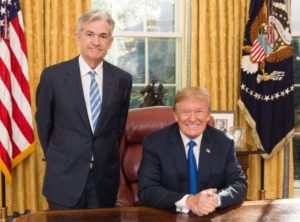 Yes and no, mostly no. It’s true Trump appointed Jerome Powell, who chairs the Federal Reserve, but that doesn’t mean he can remove him. This would be true only if the Fed boss, like cabinet secretaries, serves at the President’s pleasure. But he doesn’t.
Yes and no, mostly no. It’s true Trump appointed Jerome Powell, who chairs the Federal Reserve, but that doesn’t mean he can remove him. This would be true only if the Fed boss, like cabinet secretaries, serves at the President’s pleasure. But he doesn’t.
The Fed isn’t a cabinet position. In fact, it isn’t under the executive branch at all. It’s part private, part government; and the government portion was created by Congress to carry out “duties that lay under the authority of the legislature.” So, if anything, the Fed falls under the legislative branch. There’s separation of powers going on here, too.
The President does have statutory power to remove Fed governors, including the chair, “for cause.” But even though the Trump administration feels very much like an Alice In Wonderland experience, Trump isn’t Humpty Dumpty and “cause” doesn’t mean whatever he wants it to mean. Traditionally, it means violating the oath of office, neglecting the duties of office, corruption, or some other type of misfeasance. Ultimately, the courts decide what the definition of “cause” is and whether particular conduct falls within it. A policy disagreement, such as a dispute about raising interest rates, almost certainly does not. It’s highly unlikely that Trump has legal cause to fire Powell. (Read analysis here.)
Even so, he can try to fire Powell, and that by itself might be very disruptive to financial markets (see comment here). While Trump most likely would lose any ensuing legal battle in the courts, it’s hard to say would what happen in the meantime. It’s unclear to me whether Powell, or some interested party with standing, could get a court to issue an injunction to keep him in office during the pendency of litigation. That’s possible, but not a given, as injunction relief is discretionary with judges.
There’s a larger issue here, hanging like a Sword of Damocles over the entirety of our government, which is Trump’s lack of understanding of how our government works. He doesn’t have even a junior high schooler’s grasp of civics. He thinks he can run government like a business, i.e., the boss gives orders and everyone else carries them out. It simply doesn’t work that way. Our government consists of three independent branches, who share power between them, and you need cooperation to get anything done.
Trump doesn’t understand how politics works, either. In a political process, you don’t get things by bossing people around, but by trading for them. He will not get his border wall by demanding it; he has to offer the Democrats something they want, such as his support for a comprehensive immigration reform bill that creates pathways to citizenship and a fair process for asylum seekers. But Trump doesn’t want any immigration, he wants to keep everyone out, and turn America into an enclave for white native-borns. This puts him in the position of saying to the Democrats, “If you give me my border wall, the only thing I’ll give you in return is policies you hate which probably are illegal anyway.” If you were playing “Deal or No Deal,” which button would you push? You get the picture.
On a daily basis, Trump is continually shocked by the reality that he isn’t a dictator and can’t boss around Congress, the Federal Reserve, or other organs of government as though they were parts of the Trump Organization. He can’t set interest rates, build his border wall without a congressional funding authorization, or fire Supreme Court justices or the Fed chair after he appoints them and they’re confirmed by the Senate. There are countless things he can’t do, and it seems this President still has to learn he can’t do them, one by one. Meanwhile, the country pays a high price in chaos for his ignorance.
Photo: Once friends, now at loggerheads.
Come on be more imaginative if Trump were to follow in the footsteps of his hero Andy Jackson he would just demolish the Fed, bringing up the specter of whether the whole Fed scheme is constitutional. The nature of the Feds independence has pissed off every President since its inception. While overall as an institution political scientists give it high marks and it has been effective whether it is really constitutional is debatable, and only the Supreme Court can decide that. Most likely not answering that direct answer due to the politics between the political branches. If the court were unable to punt and had to answer the question it may well find the very institution is not constitutional, and the constitution would require amending to permit the Feds continued existence, or would come under the executive office under whatever laws the legislative branch passes. Bringing up Andy Jackson’s rejection of a Bank of the United States that caused a financial panic that the Republic survived.